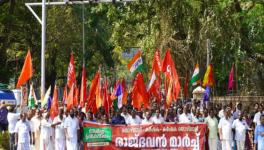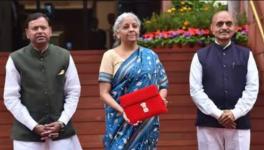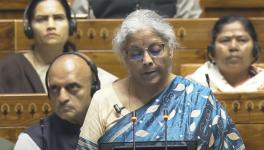Interim Budget Reflects Push for Insurance-Based Health Care: JSA
New Delhi: Expressing serious concern over the government’s lack of commitment to ‘Health for All’, the people’s health movement has decried the Interim Budget proposals that seek to strengthen the insurance-based model, which essentially seeks to fill up the pockets of private insurance companies.
The insurance-based model of healthcare comes at a huge and disastrous costs of the public provisioning of health, said a statement by Jan Swasthya Abhiyan (JSA), while responding to the proposals put forth in the Narendra Modi government’s Interim Budget, which was presented in Parliament on February 1.
“In a country like India, where a large section of the population that is poor, vulnerable and dependent on the public provisioning of health care, the consequences of the current budget are catastrophic. They also demonstrate the continuing lack of serious commitment of this Government to Health for All” the statement read.
JSA, which scrutinised budget allocations across various head, also found that there had been a decline in funds for healthcare in real terms.
For instance, the National Health Mission (NHM) has been continuously neglected in every Budget and its share in the total Union government allocation on health has gone down from 61% per cent in 2014-15 to less than half (49%) in 2019-20 Interim Budget.
“The allocation under NHM has increased only marginally by about 2% over 2018-19 (revised estimates) if one excludes the Health and Wellness Centres (HWCs) component,” it said, adding that HWCs, a key component under Ayushman Bharat, had received an allocation of Rs 1,600 crore, a “mere fraction of what is needed to achieve the goal announced by the government last year of converting 1.5 lakh Sub-Centres into HWCs.”
JSA further pointed out that including HWCs as a new scheme under NHM without making additional budgetary provisions for it, would mean that this money allocated to HWCs would come at the cost of existing interventions under the NHM.
Commenting further on the government’s “apathy” towards the public health system, the JSA said this was evident by the cut in capital expenditure by 43% in 2019-20 over the actual capex in 2017-18, which was basically meant to build infrastructure and buy equipment.
“Furthermore, the scheme to strengthen district hospitals and medical colleges with more human resources has received an additional allocation of Rs 30 crore compared to the previous budget, which, after taking into account 3.4 per cent inflation would mean significant reduction in real terms”, it said, adding that there was also a decline of nearly 40% in government spending on setting up new medical colleges and upgrading district hospitals.
“These reductions are especially harsh in the context of government’s recent announcement of providing funds and land for setting up private hospitals in Tier-2 and Tier-3 cities,” it said.
JSA also pointed out the government’s “misplaced” priorities with regard to the Pradhan Mantri Jan Arogya Yojana (PMJAY), a government funded scheme to cover secondary and tertiary level inpatient expenses for poor families.
In the 2019-20 interim budget, the Ministry of Health and Family Welfare received an allocation of Rs 63,298 crore, an increase of little more than Rs 7,000 crore compared with last year’s revised estimates. As much as 55% (Rs 4,000 crore) of this increment in allocation is devoted to one scheme- PMJAY, it said, while pointing out that the 167% increase in a single year for a single scheme was “unprecedented” in the health sector, reflecting the government’s clear push for insurance-based healthcare.
The PMJAY essentially incentivises private investment in healthcare through assured market share, as well as subsidies in the form of viability gap funding under the banner of free hospitalisation for the poor. It is one of India’s biggest public-private partnerships.
“When insurance is scaled up in a context where there is a huge inadequacy and inequity in access and an almost complete absence of regulation, it would result largely in transfer of public funds into private hands without any matching health outcomes or financial protection. The current government remains adamant on expanding the scheme,” JSA noted.
Public health activists also pointed out how the Interim Budget proposals also neglected women’s health by reducing allocations for some key schemes.
“Allocations towards Reproductive and Child Health (RCH) component under NHM, which also includes schemes like Janani Suraksha Yojana (JSY), immunisation programmes and various key disease control programmes, have experienced a cut of around RS 4,200 crores compared to expenditure in 2017-18. The allocations for Pradhan Mantri Matru Vandana Yojana (PMMVY), a scheme for maternity entitlement and wage compensation for women, was cut to half in the previous year’s revised estimate - from Rs. 2400 crores in 2018-19 BE to Rs. 1200 crores in 2018-19 RE - and in this budget an additional INR 1000 crores over 2018-19 BE have been allocated,” it said, adding that not only were allocations much lower compared to the requirements, the reduction in the allocations reflected the government’s indifference towards women’s health.
On the interim Finance Minister’s speech mentioning a 50% hike in the honorarium of the ASHAs and Anganwadi workers, JSA said this was far less than the long-standing demand for minimum wages (not less than Rs 18,000 per month), along with social security including monthly pensions of not less than Rs 3,000.
“It is striking that the Union Government spending on health stands at merely 0.31 per cent of GDP, which is much lesser than what was spent a decade back in 2009-10. The National Health Policy 2017 talks about increasing public spending to 2.5 per cent of GDP by 2025, but this would remain a far cry if the Union Government allocations towards health are not increased considerably every year by at least 30 per cent,” JSA added.
The public health activists demanded that allocations be raised to at least 2.5% per cent of GDP, as envisaged in the National Health Policy 2017, accompanied by strengthening the public provisioning of health care, upgrading of public health centres, improving working conditions of the health workforce, among others, if the goal of ‘Health for All’ is to be achieved.
Get the latest reports & analysis with people's perspective on Protests, movements & deep analytical videos, discussions of the current affairs in your Telegram app. Subscribe to NewsClick's Telegram channel & get Real-Time updates on stories, as they get published on our website.
























